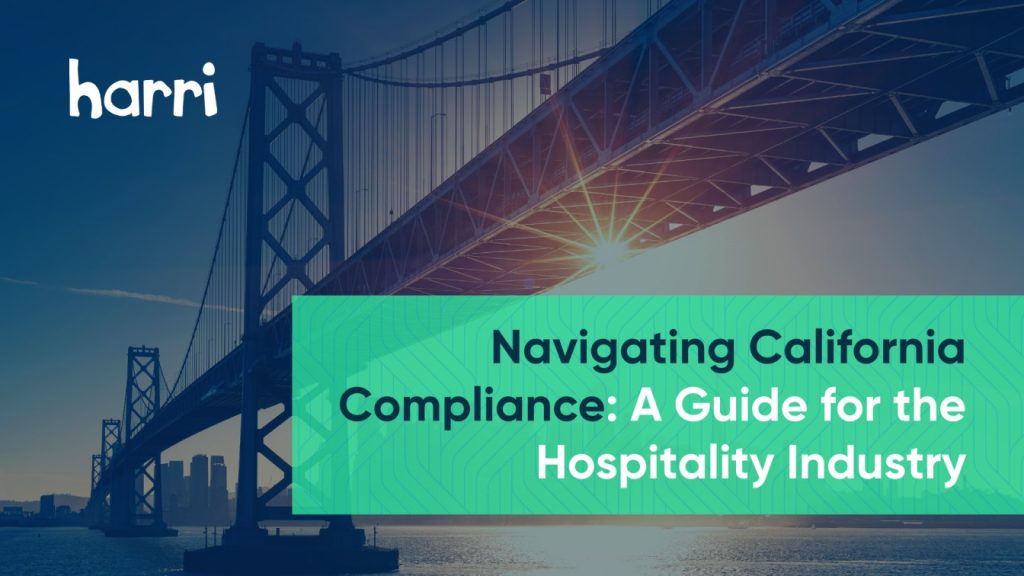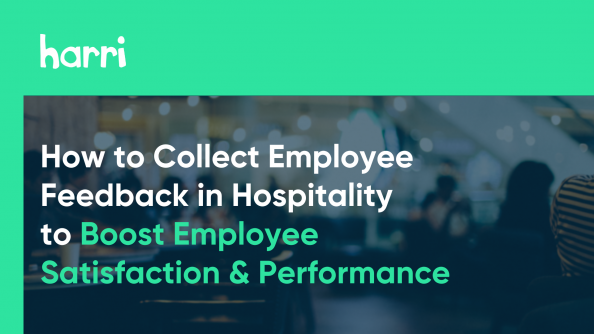Navigating California Compliance: A Guide for the Hospitality Industry

- By Harri Insider Team | September 19, 2023
Ensuring compliance with current labor laws in California demands meticulous attention, especially in an ever-changing legal environment. From wage and hour requirements to intricate rules governing employee breaks and leave, a thorough understanding is required. The key to success is understanding and proactively adapting to California’s dynamic labor laws.
Here, we explore recent California labor laws and regulations that every hospitality business owner and manager should understand. Note the following changes, incorporate optimal compliance practices at your business, and leverage Harri’s cutting-edge Human Capital Management (HCM) technology.
An example of Fair Workweek in California
The ‘fair workweek’ concept has reshaped compliance requirements, notably in Los Angeles, San Francisco, Emeryville, and soon, Berkeley. As of April 1, 2023, Los Angeles retail businesses with over 300 employees worldwide must adhere to the new Fair Work Week Ordinance. Berkeley will enforce a similar ordinance starting January 12, 2024, impacting businesses in various sectors.
Los Angeles:
The ordinance is limited to retail businesses covered under certain North American Industry Classification System (NAICS) categories. It covers eligible employees working at least two hours in a workweek within the City of Los Angeles and directs:
- Providing written good faith estimates of Work Schedules;
- 14 days advance notice of Work Schedules;
- Predictability Pay for schedule changes;
- Mandates 10 hours of rest time between shifts; and
- Offering additional work hours to current employees before hiring new employees.
Berkeley:
Applicable to businesses engaged in building services, healthcare, hotel manufacturing, retail, warehouse services, and restaurants, the ordinance introduces crucial provisions:
- Offering additional hours to part-time employees before hiring new staff;
- Requires providing written notice of work schedule changes within 24 hours;
- Ensures compensation for schedule changes made with less than 14 days’ notice;
- Provides the right to decline work within 11 hours of their previous shift; and
- Allows employees to refuse unscheduled hours added with less than 14 days’ notice.
The complex nature of predictive scheduling regulations highlights the importance of businesses utilizing proper tools and resources. Seeking support through legal counsel and innovative solutions becomes crucial for businesses that wish to adhere to these regulations.
California’s Pay Transparency and Pay Data Reporting Law
California passed Senate Bill No. 1162 on September 27, 2022, changing how employers disclose pay information. Effective January 1, 2023, companies with 15 or more employees must provide the minimum and maximum hourly or salary compensation for a position upon request from current employees and when posting for any advertised position.
The new law also requires employers to submit reports pertaining to employee compensation to the state. The reports must be filed by the second Wednesday of May of each year and must include the average and median hourly wage for various job categories categorized by race, ethnicity, and gender. Employers must also maintain records of job titles and the corresponding pay rates for their active employees and the three years following the termination of their employment.
This new legislation empowers the state to conduct investigations and impose fines on companies violating these provisions. The fines collected go into a fund to support enforcement of the law.
Through Harri’s Talent Acquisition platform, California employers can easily navigate and adhere to the recent legislative changes introduced by Senate Bill No. 1162. By facilitating accurate pay information disclosure and robust record-keeping capabilities, our HCM tech ensures compliance and operational efficiency.

CalOSHA Rules
California’s groundbreaking workplace violence prevention requirements, effective July 1, 2024, mandate employers to develop, implement, and maintain workplace violence prevention plans. Senate Bill 553 introduces comprehensive regulations, including, for example, mandatory employee training on risk awareness, de-escalation, reporting, and emergency response.
Fast Food Franchisor Responsibility Act AB 1228: What the Hospitality Industry Needs to Know
On September 28, 2023, California Governor Gavin Newsom signed AB 1228 into law, repealing the FAST Food Accountability and Standard Recovery Act (AB 257) and withdrawing the voter referendum slated for November 2024. AB 1228 intended to reinstate the joint liability portions of the FAST Act removed before Governor Newsom signed it into law and would have made fast food franchisors legally liable for labor violations committed by franchisees.
AB 257, as signed into law on September 5, 2022, would have created a statewide 10-member council and regional councils that could set minimum standards for workers in the industry. A Sacramento Superior Court judge put a temporary block on its implementation after a coalition, Save Local Restaurants, launched a referendum effort against it. On January 24, 2023, the coalition’s challenge referendum qualified for a statewide ballot measure in November 2024 and put the implementation on permanent hold until the vote. Governor Newsom signed AB 102 on July 10, 2023, with part of that bill funding the Industrial Welfare Commission (IWC) to reconvene by October 2023. The IWC would have had the authority to raise wages without limits and enact other workplace conditions for fast-food restaurants (and other industries) if the voter referendum to repeal the FAST Act had succeeded.
Representatives from the fast food industry and labor unions reached a compromise to prevent a long and expensive struggle over the voter referendum. In this agreement, fast food companies committed to withdrawing their referendum from the November 2024 ballot. In return, lawmakers agreed to revise AB 257 and cease funding to revive the IWC. Unions agreed to suspend their efforts to hold franchisors liable for labor violations committed by their franchisees under AB 1228.
AB 1228, signed on September 28, 2023, applies to fast food restaurants, defined as national chains with more than 60 establishments, primarily providing immediate consumption services. The new law mandates a $20-per-hour minimum wage for fast food workers, effective April 1, 2024, and requires annual increases until 2029. It also establishes the Fast Food Council within the Department of Industrial Relations, tasked with recommending regulations on working conditions starting in 2024. The Council, appointed by the Governor, can adjust minimum wages and recommend workplace regulations until the Council and its authority sunsets in 2029.
Harri offers an indispensable solution for California employers, particularly those in the fast-food industry. As witnessed in the complex developments surrounding AB 1228, our product ensures that businesses can seamlessly adapt to potential changes in workplace regulations, such as those anticipated with the establishment of the Fast Food Council.
Harri: Your Partner in Compliance
Every California hotel, restaurant, and hospitality establishment in California would benefit from a robust compliance management system. The complex and ever-evolving field of employment law can be more manageable with the implementation of effective compliance management software. Harri’s HCM tech is designed to streamline compliance, offering a seamless approach to meet the challenges posed by California’s dynamic employment and legal requirements.
Request a demo today to find out how Harri’s compliance technology will help your business operate within the boundaries of the law.





















